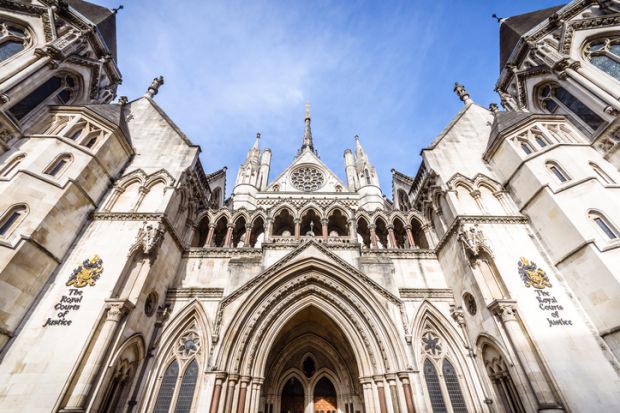The Office for Students faces “several legal challenges” to its decisions refusing providers registration and access to public student loans, while a for-profit college said it has been granted permission for a judicial review and called the regulator’s decision “unlawful”.
The developments show the intensity of the battle that the OfS has faced since taking responsibility for the regulation of all higher education institutions, including for-profit providers, and attempting to block loan access for those it judges to be failing to meet expectations.
Inclusion on the OfS register grants an institution’s students access to Student Loans Company funding – so registration decisions could determine an institution’s entire future.
In July, for-profit Bloomsbury Institute became the first college to have its application for inclusion on the OfS register of providers refused, with the regulator citing concerns over quality and management.
On 22 October, Bloomsbury Institute said the High Court had granted permission for a judicial review of the OfS decision to refuse registration, which means new students starting at the college this academic year have been unable to claim SLC funding.
Earlier this month, it emerged that Barking and Dagenham College, a public further education college, has issued a claim for judicial review against the OfS’ decision to refuse it registration.
The OfS has announced six registration refusals in total. But newly published OfS board papers state that it has made eight refusals and issued “minded to refuse” letters in a further 20 cases, suggesting providers have challenged a number of decisions, causing a delay in final announcements.
The board papers also show that Nicola Dandridge, the OfS chief executive, said at the last meeting: “We are currently dealing with several legal challenges relating to refusals of registration decisions. We are confident in resisting those challenges, though resisting them effectively will inevitably absorb staff time, particularly in the legal team.”
For a period between 2010 and 2014, for-profit providers were allowed by former Conservative universities minister Lord Willetts to mount uncontrolled expansion in their numbers of students with SLC funding.
Times Higher Education reported earlier this year that GSM London, previously England’s biggest for-profit recruiter of students with SLC funding, had been warned by the OfS that it was set to lose access to public student loans shortly before going bust.
Court papers related to the Barking and Dagenham case showed that the college is claiming that the OfS focused “exclusively on graduate progression and continuation rates, calculated according to its algorithm” in its judgement on quality and “gave little or no weight to contextual factors”.
In a statement issued by Bloomsbury Institute, John Fairhurst, the college’s academic principal and managing director, said: “The OfS decision is unlawful, unreasonable, disproportionate, and contrary to its own obligations.”
He added: “We are confident that our case will be successful and that this will have a major impact on the sector.”
Sarah Bailey, director of Bloomsbury Institute’s Centre for Student Engagement, Wellbeing and Success, said in the statement: “Our approach helps level the playing field for disadvantaged students and the regulator should be working with us, rather than using data as a blunt instrument to try and shut us down.”
Bloomsbury Institute said it has obtained data from the OfS under the Freedom of Information Act, showing that “the proportion of black, Asian and ethnic minority students in those [institutions] granted registration was…15 per cent”, while in those “refused registration it was 67 per cent” – which it said had “significant implications for equality of opportunity”.
An OfS spokesman said: “We do not comment on live litigation or any speculation raised in relation to litigation that is ongoing.”
Register to continue
Why register?
- Registration is free and only takes a moment
- Once registered, you can read 3 articles a month
- Sign up for our newsletter
Subscribe
Or subscribe for unlimited access to:
- Unlimited access to news, views, insights & reviews
- Digital editions
- Digital access to THE’s university and college rankings analysis
Already registered or a current subscriber?








